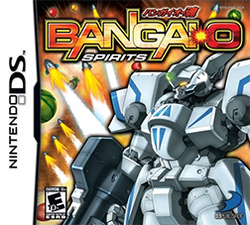Bangai-O Spirits
| Bangai-O Spirits | |
|---|---|
 |
|
| Developer(s) | Treasure |
| Publisher(s) |
|
| Director(s) | Mitsuru Yaida |
| Designer(s) | Makoto Ogino |
| Composer(s) | Norio Hanzawa |
| Platform(s) | Nintendo DS |
| Release | |
| Genre(s) | "Missile Action" |
| Mode(s) | Single player, Multiplayer |
Bangai-O Spirits is an action game for the Nintendo DS, and the sequel to Bangai-O which was released on the Nintendo 64 and Dreamcast.
Bangai-O Spirits is a side-scrolling shooting game with free-scrolling levels that extend horizontally and vertically. The player controls a robot with the ability to fly, but is still affected by gravity. He has seven weapons to choose from, and can perform melee attacks using a baseball bat or sword.
The game has 160 levels, and features a level editor to create more. Edited levels can be encoded in a sound that can be recorded with a computer and shared between players. This technology was inspired by the datacasettes used by some older computers, including the Sharp X1 on which Matsumoto learned to program.
Bangai-O Spirits has very little story line, and is not part of the same continuity as the previous game. The two new pilots are called Masato (boy) and Ruri (girl). The campaign mode is limited to a brief set of tutorial stages.
Upon completing all of the stages under "Treasure's Best" in free mode, a brief cutscene will play, with one of the characters saying "We're only here because the fanboys would throw a fit on the internet if the game didn't have an ending."
In a rare breach of the company's usual secrecy about future plans, developer Yoshiyuki Matsumoto first hinted at a sequel to Bangai-O in a 2003 interview on Sega's website to promote the game Astro Boy: Omega Factor. When asked what game he would like to create next, he said he would like to "carry out Bakuretsu Muteki Bangai-O's revenge."
Treasure began working on a concept demo before a publisher was involved. Full production followed the completion of their previous handheld release, Bleach: Dark Souls. When publisher ESP approached them about a possible collaboration, Bangai-O seemed like a logical fit. On September 11, 2007, Weekly Famitsu announced the game officially, and it was demonstrated at Tokyo Game Show later that month.
...
Wikipedia
